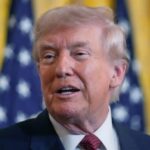
Authored by Judith Bergman via The Gatestone Institute,
The United States recently banned TikTok from all federal government devices over growing security concerns. That is a good start.
TikTok, FBI Director Christopher Wray warned at the beginning of December, is controlled by the Chinese government, which is a national security concern.
TikTok, a video-sharing app owned by Chinese company ByteDance, has, according to TikTok's own estimates, 1 billion users worldwide. In 2021, TikTok had approximately 87 million users in the US, according to Statista. Disturbingly, a recent study found that 10% of US adults get their news from the Chinese app, up from 3% in 2020.
Wray said that China's government can control the app's recommendation algorithm, "which allows them to manipulate content, and if they want to, to use it for influence operations."
"All of these things are in the hands of a government that doesn't share our values, and that has a mission that's very much at odds with what's in the best interests of the United States. That should concern us," Wray said in a speech at the University of Michigan.
Wray's comments echoed those he made at the "Worldwide Threats to the Homeland" hearing held at the House of Representatives Homeland Security Committee on November 15.
"We do have national security concerns at least from the FBI's end about TikTok," Wray stated.
"They include the possibility that the Chinese government could use it to control data collection on millions of users. Or control the recommendation algorithm, which could be used for influence operations if they so chose. Or to control software on millions of devices, which gives it opportunity to potentially technically compromise personal devices."
Wray's concerns are not new -- actually, they come a bit late. In 2020, President Donald J. Trump, citing similar security concerns, tried to ban the app in the US, in addition to sanctioning the company, but several federal judges ruled against both sanctions and a ban, blocking his attempts. One judge ruled that the ban failed "to adequately consider an obvious and reasonable alternative before banning TikTok" and that the ban was "arbitrary and capricious."
"ByteDance's submission and compliance with Chinese law has rendered it a reliable, useful, and far reaching ear and mouthpiece for the Party and State," the Trump administration wrote at the time in a document motivating the proposed ban. The document cited ByteDance's commitment to the Chinese Communist Party (CCP) as resulting in "systemic censorship of content across its platforms" and "the harvesting of user data."
In the document, the Trump administration stressed noted:
"ByteDance, as a company, and its subsidiaries are subject to PRC national security laws that require or compel the assistance of any Chinese citizen or entity in surveillance and intelligence operations. As ByteDance is subject to PRC jurisdiction, PRC laws can compel cooperation from ByteDance..."
Chinese law requires all Chinese companies to turn over information to the Communist Party upon request -- and ByteDance reportedly employs more than 130 Party members to ensure compliance, among other matters.
The Trump administration stated :
"One of the foremost national security risks presented by the TikTok mobile application in the United States is the possibility that the PRC government could, through lawful authority, extralegal influence (Communist Party) influence, or PRCISS, compel TikTok to provide systemic access to U.S. user's sensitive personal information. A number of press reports clearly indicate the PRC Government has already compelled TikTok to assist them for domestic surveillance, censorship, and propaganda action within China, and their compliance is indicative of how they are likely to respond to intelligence requests on U.S. users. Given the bounty of information TikTok could offer on foreign users, as well as the aforementioned cyber tactics employed by the PRC, the Department of Commerce assesses the PRC and PRCISS would not limit their use of TikTok to domestic concerns and would instead use it for foreign intelligence and surveillance."
Furthermore, similar to the concerns expressed by Wray, the Trump administration argued,
"The PRC government and the CCP can exert influence on ByteDance and, through the TikTok app, censor and shape content available to U.S. users in ways that can influence their opinions and views of China."
In April 2021, U.S. Senator Josh Hawley wrote:
"TikTok is a Trojan Horse for the Chinese Communist Party that has no place on government devices—or any American devices, for that matter.... TikTok has repeatedly proven itself to be a malicious actor."
According to Adonis Hoffman, a former chief of staff and senior legal advisor at the FCC who has served in legal and policy positions in the U.S. House of Representatives:
"Its algorithm is at once simple and sinister. Download the app on your smartphone and you have given China access to all your data... This opens a treasure trove of data on millions of Americans for the Chinese government to use whenever and however they choose. And history shows they use that data for nefarious purposes."
President Joe Biden reversed Trump's attempt at banning TikTok, signing an executive order in June 2021 that revoked Trump's proposed ban. Instead, the Biden administration has sought to work out the security concerns with ByteDance through a negotiated deal with the Chinese company that would reportedly allow TikTok to continue operating in the US without any change of ownership.
"Well, I think Donald Trump was right," Senator Mark Warner, D-Va., chair of the Senate Intelligence Committee, recently said.
"I mean, TikTok is an enormous threat. So, if you're a parent, and you've got a kid on TikTok, I would be very, very concerned. All of that data that your child is inputting and receiving is being stored somewhere in Beijing."
Brendan Carr, a Republican commissioner at the Federal Communications Commission, said in November that the only way to resolve the national security concerns regarding TikTok would be to ban the app.
"I don't believe there is a path forward for anything other than a ban," Carr said. According to Axios:
There simply isn't "a world in which you could come up with sufficient protection on the data that you could have sufficient confidence that it's not finding its way back into the hands of the [Chinese Communist Party]," Carr said.
In October, Forbes revealed that a China-based team at ByteDance had planned to use TikTok to track the locations of an unspecified number of Americans.
In December, it was revealed that ByteDance had used the app to surveil several journalists to track down the journalists' sources.
According to Texas Governor Greg Abbott:
"TikTok harvests vast amounts of data from its users' devices -- including when, where and how they conduct internet activity -- and offers this trove of potentially sensitive information to the Chinese government,"
Also in December, Indiana became the first U.S. state to sue TikTok, for misleading users about the Chinese government's capacity to access their data and showing mature content to minors.
"The company's ownership of TikTok is problematic for two reasons," wrote Republican Senator Marco Rubio and Republican US Representative Mike Gallagher.
"First, the app can track cellphone users' locations and collect internet-browsing data — even when users are visiting unrelated website.
"That TikTok, and by extension the CCP, has the ability to survey every keystroke teenagers enter on their phones is disturbing. With this app, Beijing could also collect sensitive national security information from U.S. government employees and develop profiles on millions of Americans to use for blackmail or espionage...
Even more alarming than that possibility, however, are the potential abuses of TikTok's algorithm...
Its algorithm is a black box, in that its designers can alter its operation at any time without informing users... in the hands of ByteDance, it could also be used to subtly indoctrinate American citizens.
TikTok has already censored references to politically sensitive topics, including the treatment of workers in Xinjiang, China, and the 1989 protests in Tiananmen Square. It has temporarily blocked an American teenager who criticized the treatment of Uyghurs in China. In German videos about Chinese conduct toward Uyghurs, TikTok has modified subtitles for terms such as 'reeducation camp' and 'labor camp,' replacing words with asterisks."
In China, the content available on TikTok could not be more different. China serves up the "spinach version": science, physics, engineering and patriotism. In the US, TikTok serves up the "opium version." Tristan Harris, a former Google employee, said of China's approach to TikTok on CBS' 60 Minutes:
"It's almost like [the Chinese] recognize that technology is influencing kids' development, and they make their domestic version a spinach version of TikTok, while they ship the opium version to the rest of the world."
"If you're under 14 years old, they show you science experiments you can do at home, museum exhibits, patriotism videos and educational videos," said Harris of the content served by TikTok within China, adding that Chinese children were limited to only 40 minutes a day on the app.
"There's a survey of pre-teens in the U.S. and China asking, 'what is the most aspirational career that you want to have?' and in the U.S., the No. 1 was a social media influencer, and in China, the No. 1 was astronaut. You allow those two societies to play out for a few generations and I can tell you what your world is going to look like."
TikTok urgently needs to be banned from the US and the rest of the free world.
Authored by Judith Bergman via The Gatestone Institute,
The United States recently banned TikTok from all federal government devices over growing security concerns. That is a good start.
TikTok, FBI Director Christopher Wray warned at the beginning of December, is controlled by the Chinese government, which is a national security concern.
TikTok, a video-sharing app owned by Chinese company ByteDance, has, according to TikTok’s own estimates, 1 billion users worldwide. In 2021, TikTok had approximately 87 million users in the US, according to Statista. Disturbingly, a recent study found that 10% of US adults get their news from the Chinese app, up from 3% in 2020.
Wray said that China’s government can control the app’s recommendation algorithm, “which allows them to manipulate content, and if they want to, to use it for influence operations.”
“All of these things are in the hands of a government that doesn’t share our values, and that has a mission that’s very much at odds with what’s in the best interests of the United States. That should concern us,” Wray said in a speech at the University of Michigan.
Wray’s comments echoed those he made at the “Worldwide Threats to the Homeland” hearing held at the House of Representatives Homeland Security Committee on November 15.
“We do have national security concerns at least from the FBI’s end about TikTok,” Wray stated.
“They include the possibility that the Chinese government could use it to control data collection on millions of users. Or control the recommendation algorithm, which could be used for influence operations if they so chose. Or to control software on millions of devices, which gives it opportunity to potentially technically compromise personal devices.”
Wray’s concerns are not new — actually, they come a bit late. In 2020, President Donald J. Trump, citing similar security concerns, tried to ban the app in the US, in addition to sanctioning the company, but several federal judges ruled against both sanctions and a ban, blocking his attempts. One judge ruled that the ban failed “to adequately consider an obvious and reasonable alternative before banning TikTok” and that the ban was “arbitrary and capricious.”
“ByteDance’s submission and compliance with Chinese law has rendered it a reliable, useful, and far reaching ear and mouthpiece for the Party and State,” the Trump administration wrote at the time in a document motivating the proposed ban. The document cited ByteDance’s commitment to the Chinese Communist Party (CCP) as resulting in “systemic censorship of content across its platforms” and “the harvesting of user data.”
In the document, the Trump administration stressed noted:
“ByteDance, as a company, and its subsidiaries are subject to PRC national security laws that require or compel the assistance of any Chinese citizen or entity in surveillance and intelligence operations. As ByteDance is subject to PRC jurisdiction, PRC laws can compel cooperation from ByteDance…”
Chinese law requires all Chinese companies to turn over information to the Communist Party upon request — and ByteDance reportedly employs more than 130 Party members to ensure compliance, among other matters.
The Trump administration stated :
“One of the foremost national security risks presented by the TikTok mobile application in the United States is the possibility that the PRC government could, through lawful authority, extralegal influence (Communist Party) influence, or PRCISS, compel TikTok to provide systemic access to U.S. user’s sensitive personal information. A number of press reports clearly indicate the PRC Government has already compelled TikTok to assist them for domestic surveillance, censorship, and propaganda action within China, and their compliance is indicative of how they are likely to respond to intelligence requests on U.S. users. Given the bounty of information TikTok could offer on foreign users, as well as the aforementioned cyber tactics employed by the PRC, the Department of Commerce assesses the PRC and PRCISS would not limit their use of TikTok to domestic concerns and would instead use it for foreign intelligence and surveillance.”
Furthermore, similar to the concerns expressed by Wray, the Trump administration argued,
“The PRC government and the CCP can exert influence on ByteDance and, through the TikTok app, censor and shape content available to U.S. users in ways that can influence their opinions and views of China.”
In April 2021, U.S. Senator Josh Hawley wrote:
“TikTok is a Trojan Horse for the Chinese Communist Party that has no place on government devices—or any American devices, for that matter…. TikTok has repeatedly proven itself to be a malicious actor.”
According to Adonis Hoffman, a former chief of staff and senior legal advisor at the FCC who has served in legal and policy positions in the U.S. House of Representatives:
“Its algorithm is at once simple and sinister. Download the app on your smartphone and you have given China access to all your data… This opens a treasure trove of data on millions of Americans for the Chinese government to use whenever and however they choose. And history shows they use that data for nefarious purposes.”
President Joe Biden reversed Trump’s attempt at banning TikTok, signing an executive order in June 2021 that revoked Trump’s proposed ban. Instead, the Biden administration has sought to work out the security concerns with ByteDance through a negotiated deal with the Chinese company that would reportedly allow TikTok to continue operating in the US without any change of ownership.
“Well, I think Donald Trump was right,” Senator Mark Warner, D-Va., chair of the Senate Intelligence Committee, recently said.
“I mean, TikTok is an enormous threat. So, if you’re a parent, and you’ve got a kid on TikTok, I would be very, very concerned. All of that data that your child is inputting and receiving is being stored somewhere in Beijing.”
Brendan Carr, a Republican commissioner at the Federal Communications Commission, said in November that the only way to resolve the national security concerns regarding TikTok would be to ban the app.
“I don’t believe there is a path forward for anything other than a ban,” Carr said. According to Axios:
There simply isn’t “a world in which you could come up with sufficient protection on the data that you could have sufficient confidence that it’s not finding its way back into the hands of the [Chinese Communist Party],” Carr said.
In October, Forbes revealed that a China-based team at ByteDance had planned to use TikTok to track the locations of an unspecified number of Americans.
In December, it was revealed that ByteDance had used the app to surveil several journalists to track down the journalists’ sources.
According to Texas Governor Greg Abbott:
“TikTok harvests vast amounts of data from its users’ devices — including when, where and how they conduct internet activity — and offers this trove of potentially sensitive information to the Chinese government,”
Also in December, Indiana became the first U.S. state to sue TikTok, for misleading users about the Chinese government’s capacity to access their data and showing mature content to minors.
“The company’s ownership of TikTok is problematic for two reasons,” wrote Republican Senator Marco Rubio and Republican US Representative Mike Gallagher.
“First, the app can track cellphone users’ locations and collect internet-browsing data — even when users are visiting unrelated website.
“That TikTok, and by extension the CCP, has the ability to survey every keystroke teenagers enter on their phones is disturbing. With this app, Beijing could also collect sensitive national security information from U.S. government employees and develop profiles on millions of Americans to use for blackmail or espionage…
Even more alarming than that possibility, however, are the potential abuses of TikTok’s algorithm…
Its algorithm is a black box, in that its designers can alter its operation at any time without informing users… in the hands of ByteDance, it could also be used to subtly indoctrinate American citizens.
TikTok has already censored references to politically sensitive topics, including the treatment of workers in Xinjiang, China, and the 1989 protests in Tiananmen Square. It has temporarily blocked an American teenager who criticized the treatment of Uyghurs in China. In German videos about Chinese conduct toward Uyghurs, TikTok has modified subtitles for terms such as ‘reeducation camp’ and ‘labor camp,’ replacing words with asterisks.”
In China, the content available on TikTok could not be more different. China serves up the “spinach version“: science, physics, engineering and patriotism. In the US, TikTok serves up the “opium version.” Tristan Harris, a former Google employee, said of China’s approach to TikTok on CBS’ 60 Minutes:
“It’s almost like [the Chinese] recognize that technology is influencing kids’ development, and they make their domestic version a spinach version of TikTok, while they ship the opium version to the rest of the world.”
“If you’re under 14 years old, they show you science experiments you can do at home, museum exhibits, patriotism videos and educational videos,” said Harris of the content served by TikTok within China, adding that Chinese children were limited to only 40 minutes a day on the app.
“There’s a survey of pre-teens in the U.S. and China asking, ‘what is the most aspirational career that you want to have?’ and in the U.S., the No. 1 was a social media influencer, and in China, the No. 1 was astronaut. You allow those two societies to play out for a few generations and I can tell you what your world is going to look like.”
TikTok urgently needs to be banned from the US and the rest of the free world.
Loading…






